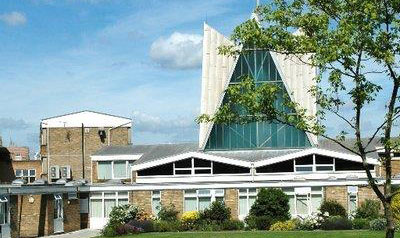The twentieth anniversary of the Good Friday Agreement has provided the ‘perfect backdrop’ for English university students exploring policing systems in Northern Ireland.

Canterbury Christ Church University
The students, who are part of a 25 strong delegation from the BSc in Policing at Canterbury Christ Church University, were addressed by investigators from the Police Ombudsman’s Office today (Thursday 19 April) as part of a week-long exploration of the criminal justice system in Northern Ireland.
Focussing on the operation of local policing systems and the differences in policing structures across the globe, the students also looked at the issues of policing in a post-conflict society.
Policing reform and the impact of the Ombudsman’s work as part of that reform were also addressed in the presentation delivered by investigators Mark McConnell and June McConnell.
Director of Student Engagement for Canterbury’s School of Law, Criminal Justice and Computing, Jane Owens said that although having taken place for the last four years, this year’s event had taken on an added significance, coming as it does around the twentieth anniversary of the Good Friday Agreement.
The trip is designed to give students an opportunity to understand similarities and differences in policing.
“The trip is designed to give students an opportunity to understand the similarities and differences in policing two different parts of the United Kingdom,” she said.
“Throughout this week they have been exploring how the Police Service of Northern Ireland deals with issues of managing a society which has been, and still is to an extent, in conflict.
“With the recent anniversary of the Good Friday Agreement, it has been an appropriate time for us to consider the past, present and future of the ‘Troubles’ in Northern Ireland and the pressures placed, not only on police, but also local communities.”
Mark McConnell from the Police Ombudsman’s Office said highlighting the Ombudsman’s work was an important part of its function.
“In the Police Ombudsman in Northern Ireland we have a truly independent complaints and investigations system, which is not the case in many parts of the world. The Office is held up as an example of best practice across the globe so it is important to share that with the next generation of police officers, both here and in other parts of the UK.”
As part of their visit the delegation from Canterbury also met with former justice minister David Ford, had a tour of Stormont and of Belfast and spent a full day at Musgrave PSNI station where they met a Neighbourhood Inspector and Divisional Superintendent amongst others.
The BSc in Policing is a three-year full-time course and six-year part-time, which looks at issues such as police governance, police-related law and procedures and police ethics and decision-making, and is partly accredited by the College of Policing for England and Wales.